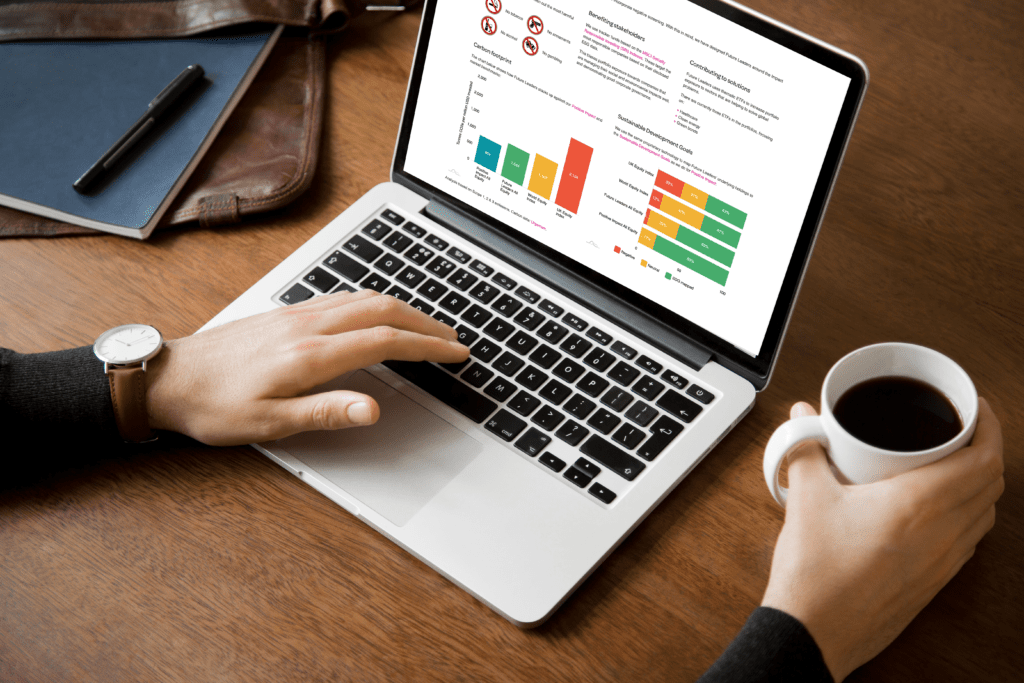If you’re considering how to invest your money, Ethical Investing or ESG investing is definitely worth considering. In fact, a meta-study by the University of Oxford showed that companies with better sustainability practices tended to have better operational performance and offer superior stock price performance relative to companies rated lower for ESG. So, not only is it a more purpose-led form of investing, but it’s one that will give you a genuine return on your investment.
There are many Ethical Investing definitions and types and not all are created equal. Often you’ll find the phrases used interchangeably, and when you’re first dipping your toe into the world of ethical investing, this can cause a bit of a headache.
That’s why we’ve pulled together this handy guide taking you through the different forms of ethical investing and what they actually mean for you as an investor.
Ethical investing defined
Traditionally, ethical investing focuses on excluding a set of industries or companies based on controversial behaviour often called the “sin stocks”. It originated in the 18th century, when religious groups were excluding companies such as liquor, tobacco, gambling or slave trade from their portfolio.
Today, ethical investing has taken on a wider meaning. It looks at profitable companies who are actually striving to ‘do good‘, rather than focusing purely on their own financial gains. Its core purpose is to even the playing field and redistribute global wealth in order to bring about a fairer, more equal world.
For investors, there’s a wealth of reasons to get involved in ethical investing. It’s an unparalleled means of seeing a major return on your investments while having a positive impact on the world. You can choose the areas that most align with your personal and business values and build it into a strategic and sustainable investment portfolio with just the right level of risk for your unique circumstances.

What is ESG? – Environmental, Social And Governance Investing defined
ESG investing refers to the three categories of criteria used to assess companies when investing responsibly: ‘E’ stands for ‘environmental’ factors, such as carbon emission and water management; ’S’ stands for ‘social’ factors, such as employee welfare, diversity and inclusion; ‘G’ stands for ‘governance’ factors, such as business ethics and corruption.
ESG ratings are an objective evaluation of a company’s commitment to sustainable business practices and are independent of the industry in which it operates. For example, not all oil companies will have a low ESG score and not all tech companies will have sky-high scores.

Ethical Investing vs ESG
Ethical investing is not a new concept. When it first came about back in the 18th century, its primary purpose was to exclude a set of industries or companies based on controversial behaviour often called the “sin stocks”. This meant that investment strategies would apply a values-based negative screen on industries like tobacco, alcohol, or pornography. While this is still relevant, ethical investing has taken on a far wider remit in order to mark how ‘good’ a company is while making a return on investment.
ESG investing, on the other hand, takes an even more expansive approach. It doesn’t exclude any companies and focuses predominantly on the environmental, social and governance impact of a company. These factors then contribute to the investment decision-making process.
RELATED: SOCIALLY RESPONSIBLE INVESTING VS ESG
UN Sustainable Development Goals
The UN Sustainable Development Goals. Launched following the 2015 UN Summit in Paris, the 17 Sustainable Development Goals address the issues the UN sees as most challenging to our world; these include gender equality, climate action, sustainable cities and communities and good health and wellbeing.
These goals are a key driving force when it comes to ethical investing, as essentially the UN wants to encourage businesses that can still turn around a profit while doing their bit for the greater good.

Types of Ethical Investing
Environmentally ethical investing
Environmental investing is something that has seen a real boom in recent years as investors, consumers and governments place a renewed emphasis on climate change and sustainability.
Environmental investing looks at the extent to which a company is taking a ‘green’ approach to their business operations. And there’s an enormous set of criteria that you can take advantage of. Anything from analysing how dependent a business is on fossil fuels, to how much waste it is producing or how it treats animals can be considered.
On the other hand, it could look at any major environmental risks that a company is taking: this could include their carbon emissions, whether their buildings are sustainable, how efficient their energy usage is. It all comes into play with environmental investing.
Socially ethical investing
Social investing looks at how a company manages its relationships with people including employees, suppliers, customers and local communities. And again, there are plenty of boxes to tick.
Criteria might include whether a business has any diversity or inclusiveness policies, or how it treats its staff. This could include mental health and wellbeing support (or lack thereof).
When it comes to suppliers, social investing assesses the businesses that a firm works with. This is important, as while a company may be able to claim they are socially responsible and conscious, if their suppliers have poor practices then it needs to be taken into account.
Ultimately, the business should benefit society as much as possible. An ESG investor may, therefore, look at whether the company helps people beyond those it sells to, from or employs.
Investing in Ethically governed businesses
Governing practices are important in ESG investing, and it’s no surprise. A business that is run well is more likely to succeed over the long term than one that isn’t.
But what constitutes a company that is run well? Common criteria might include how open and transparent their accounting practices are and whether or not their shareholders play a role in important decisions. It would also take into account how much it pays its board, plus how diverse that board is and what level of bonuses they receive.
Other important factors include their business ethics, any political instability, conflicts of interest and tax transparency.
Investing in ESG Funds
ESG funds are a set of companies that have all been screened in line with ESG criteria. It looks at all companies – none are excluded – and therefore delivers a range of industries.
Think of it like the FTSE 500. ESG funds provide you, the investor, with a purpose-led mix of investment opportunities that have already been vetted to make sure they are in line with ESG requirements.
When looking at ESG funds, it’s important to remember that the best ESG funds also focus on the impact achieved by businesses’ core products and services, and not just secondary operations which can make the company look good on paper but allow non-sustainable practices to continue elsewhere in the business. They will measure the underlying impact of the company as a whole and not just look at selected bits of the company that are doing good things. This is something that you want to consider carefully when choosing the right investment route for you.
RELATED: ESG INVESTING | A BEGINNER’S GUIDE
Impact Investment Fund
Although ESG investing is sometimes confused with Impact investing, the two are not the same.
The two sit on a spectrum; so while there will be a crossover, not all ESG investing is impact investing and it should be seen as the ‘step before’. If ESG investing sits high on the scale, impact investing is on a scale of its own.
If you look at the full scale of investing from an ethical perspective, traditional investment sits at the lowest end and philanthropy is at the top. ESG investing allows bad companies to do good, whereas impact investing holds companies and investment funds to a higher moral standard where the starting point is ‘do no harm’.
Ultimately, the level you choose is determined by the impact you want to have. While ESG investing is great, choosing an impact investment fund takes the lead.
B Corps
B corps are the gold standard when it comes to ethically run businesses. Their stated mission as a nonprofit network is to make business a force for good. Vowing to transform “the global economy to benefit all people, communities, and the planet”.
The B-corp standard requires businesses to look at their impact from a holistic point of view B Corps looks at a company’s impact as a whole entity.
If you’re looking to invest in an individual business rather than a fund
RELATED: SOCIALLY RESPONSIBLE INVESTING VS ESG
Socially responsible & Impact Investing defined
When it comes to the scale of what is deemed an ethical manner of investing, socially responsible investing is pretty much the best of the best. It is considered a harder and more expensive practice, but it is one with an enormous impact.
With socially responsible and impact investing, both the positive and negative impacts of a company will be screened. And this is important: often companies can get away with claiming to be socially responsible without changing their core structure. This approach means that a company has to do more than look good on paper; it has to have substance to back it up.
It’s vital to remember that with all forms of ethical investing, there is still a level of risk involved. It is therefore important that you consider your attitude for risk before building ethical investing funds into your portfolio. This is something that a financial advisor can help you with.
Interested in finding out more about Ethical Investing & Impact Investing? Schedule a free no-obligation call with our Financial Advisor



